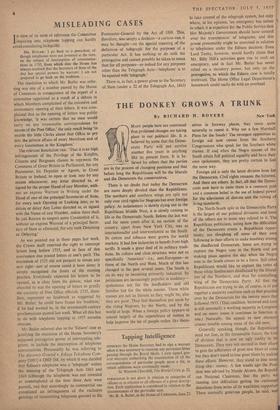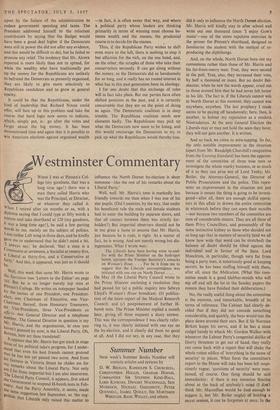THE DONKEY GROWS A TRUNK
MANY people here are convinced that profound changes are taking place in our political life. It is believed by some that the Demo- cratic Party will not survive another five years in anything like its present form. It is be- lieved by others that the parties are in the process of changing positions and that before long the Republicans will be the liberals and the Democrats the conservatives, There is no doubt that today the Democrats are more deeply divided than the Republicans. The northern and southern wings are split not only over civil rights for Negroes but over foreign policy. As isolationism is slowly dying out in the Republican Middle West, it is slowly coming to life in the Democratic South. Before the last war and for some years after it, no section of the country, apart from New York City, was as internationalist and interventionist as the South. Its cotton and tobacco were grown for world markets. It had few industries to benefit from high tariffs. It made a great deal of its military tradi- tions. Its culture and class structure were not as specifically 'American'—i.e., anti-European—as those of the North and West. Much of this has changed in the past several years. The South is on its way to becoming primarily industrial. Its politicians arc increasingly populist in tendency— spokesmen not for the landholders and old families but for the white masses. These white masses are not as literate as they might be; also they are poor. They feel themselves put upon by the rising Negroes, by the North, and by the world at large. When a foreign policy appears to consist largely of the expenditure of money to help improve the lot of people rather like them-
selves in faraway places, they come quite naturally to resent it. Why not a few Marshall Plans for the South? The strongest opposition to foreign aid now conies from the Southern Congressmen who speak for the Southern white masses. If and when the Negro masses of the South attain full political equality and have their own spokesmen, they are pretty certain to feel the same way.
Foreign aid is only the latest divisive issue for the Democrats. Civil rights remains the bitterest.
And there are others. In fact, all that the Demo- crats now have to unite them is a common past and a common belief in the use of federal power for the alleviation of distress and the raising of • living standards.
The North-South split in the Democratic Party is the largest of our political divisions, and most
of the others are in some way related to it. The Republican politicians, seeing how the difficulties of the Democrats create a Republican oppor- tunity, are sloughing off some of their own following in their efforts to make headway among the disaffected Democrats. Some are trying to capture the Negro vote in the North and arc making plans against the day when the Negro vote in the South conies to be a force. Still other
Republicans would like to capture the votes of
those white Southerners disaffected by the liberal. ism of the Northern, and thus far controlling, wing of the Democratic Party. All that the Republicans are trying to do, of course, is to put together a majority coalition such as that presided over by the Democrats for the twenty years that followed 1933. (That coalition, battered and torn, is still nominally a working majority in Congress
and on many issues it continues to function 10. one.) Naturally, the appeal to new element' creates trouble among some of the old ones.
Generally speaking, though, the Republicans need not fear, in the foreseeable future, the kind of division that is now an ugly reality to the Democrats. They may not succeed in their efforts to gain the adherence of great new blocs of votes but they don't stand to lose great blocs by making these efforts. However, they stand to lose some' thing else: money. A few weeks ago the Press dent was advised by Meade Alcorn, the Republi can National Chairman, that the party wa! running into difficulties getting the customary donations from some of its wealthiest supporters These normally generous people, he said, wed
upset by the failure of the administration to reduce government spending and taxes. The President addressed himself to the reluctant contributors by saying that the Budget would have been a good deal higher if the Democrats were still in power (he did not offer any evidence, and this would be difficult to do), but he failed to promise any relief. The tendency that Mr. Alcorn reported is more likely than not to spread, for while the wealthy who have traditionally put up the money for the Republicans are unlikely to befriend the Democrats as presently organised, they are likely to give more selectively to Republican candidates and to grow in general apathy.
It could be that the Republicans, under the kind of leadership that Richard Nixon could offer, will face up to this problem and take the course that hard logic now seems to indicate, which, simply put, is : go after the votes and forget about the big money. It has been demonstrated time and again that it is possible to win American elections against organised wealth —in fact, it is often easier that way, and where a political party whose leaders are thinking primarily in terms of winning must choose be- tween wealth and the masses, the prudential course is to decide for the masses.
Thus, if the Republican Party wishes to shift even more to the left, there is nothing to stop it but affection for the rich, on the one hand, and, on the other, the scruples of those who take their conservatism seriously. It can get along without the money, as the Democrats did so handsomely for so long, and it really has no rooted interest in what has in this past generation been its ideology.
I for one doubt that this exchange of roles will in fact take place. But our parties have often shifted positions in the past, and it is certainly conceivable that they are on the point of doing so again. The Democratic coalition is in deep trouble. The Republican coalition needs new elements badly. The Republicans may pick up what the Democrats now seem to be losing, and this would encourage the Democrats to try to pick up what the Republicans would thereby lose.















































 Previous page
Previous page